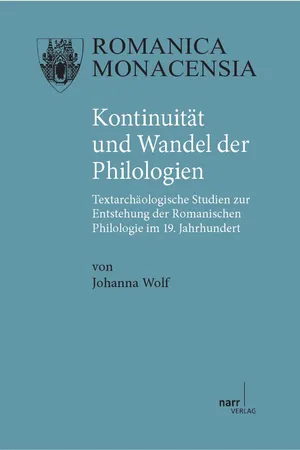
Kontinuität und Wandel der Philologien
Textarchäologische Studien zur Entstehung der Romanischen Philologie im 19. Jahrhundert
- English
- PDF
- Available on iOS & Android
Kontinuität und Wandel der Philologien
Textarchäologische Studien zur Entstehung der Romanischen Philologie im 19. Jahrhundert
About this book
Die vorliegende Studie untersucht die zentralen gegenstands-, methoden- und institutionsbezogenen Konzepte, die der Ausbildung der Romanischen Philologie im 19. Jahrhundert zugrunde liegen. Analysiert wird ein Korpus von programmatischen Schriften der frühen "Romanisten", in denen über die Identität des eigenen Fachs, wissenschaftliche Ansprüche und die Abgrenzung zu anderen Disziplinen sowie über die Ziele romanischer Forschung und Lehre verhandelt wird. Diese Schriften sind Gegenstand einer diskursanalytisch akzentuierten Textarchäologie, die die Intertextualität des (neu)philologischen Diskurses, die Mechanismen diskursiver Inklusion und Exklusion sowie relevante ideengeschichtliche Entwicklungen aufdecken soll. Ziel der Studie ist es, die fundamentale Spannung zwischen dem neuen szientistischen Wissenschaftsverständnis und dem kulturphilosophisch und ethisch fundierten Philologiekonzept aufzuzeigen, die die Herausbildung des Faches bestimmt.
Frequently asked questions
- Essential is ideal for learners and professionals who enjoy exploring a wide range of subjects. Access the Essential Library with 800,000+ trusted titles and best-sellers across business, personal growth, and the humanities. Includes unlimited reading time and Standard Read Aloud voice.
- Complete: Perfect for advanced learners and researchers needing full, unrestricted access. Unlock 1.4M+ books across hundreds of subjects, including academic and specialized titles. The Complete Plan also includes advanced features like Premium Read Aloud and Research Assistant.
Please note we cannot support devices running on iOS 13 and Android 7 or earlier. Learn more about using the app.
Information
Table of contents
- Inhalt
- Vorwort und Danksagung
- 1 Gebrochene Geschichte: Textbegegnungenals Perspektive des Erzählens
- 2 Im Steinbruch des Textes oder der Text alsSchlussstein? Problemfelder einerwissenschaftsgeschichtlichenTextinterpretation
- 3 „Die Verwandlung der Welt“:1 EpistemischeVerschiebungen und Erkenntnisprozesse alsBedingungen der Philologiegenese
- 4 Natur oder Geist? Historisch-VergleichendeSprachwissenschaft als „Gegenentwurf“?
- 5 Die Diskursformationen derNeuphilologien: Zwischen(Kultur)Pädagogik und Wissenschaft
- 6 Der Vorhang zu und alle Fragen offen? –Versuch einer typologischenKategorisierung und Schlussbetrachtungen
- 7 Bibliographie